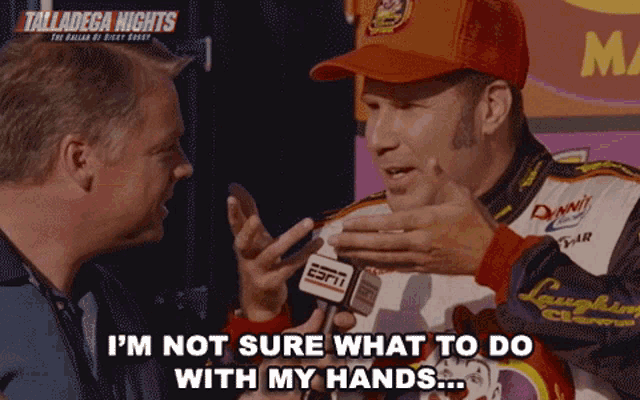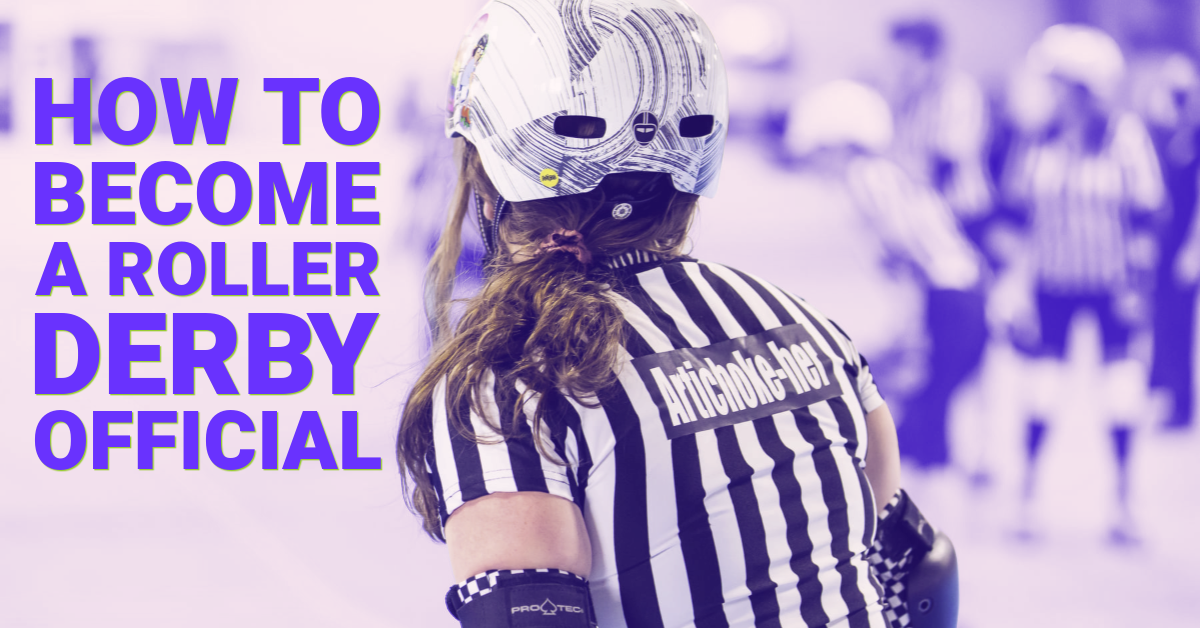Step 1: Find A Local League
Roller derby is a unique and challenging sport to officiate. The best way to start is by doing. Find a roller derby league near you by checking the following membership directories for the major roller derby associations:
- Women’s Flat Track Derby Association aka WFTDA (Woof-tuh-duh)
- Men’s Roller Derby Association aka MRDA (Mur-duh)
- Junior Roller Derby Association aka JRDA (Jer-duh)
- USA Roller Sports aka USARS (You-sars)
- Roller Derby Coalition of Leagues aka RDCL (Banked-track)
Once you’ve found a local league (or leagues if you’re lucky!), contact them. Ask them about their scrimmage schedule.
Note: How Many Officials?!
The sport of roller derby requires 17 total officials (7 skating, 10 non-skating) for sanctioned play, so leagues are always in need of officials. That’s more than the number of players on the track at one time (10 total, 2 teams of 5) AND the number of players allowed on a game roster (15 players.)
Step 2: Go to Scrimmage
Now some folks may be surprised the next step isn’t “Learn to Skate,” but like I said before, more non-skating officials are required for a game. If you want to develop quickly as a roller derby official, all experience is vital.
For example, having experience as a Score Keeper will help if you want to be a Jam Referee later. These two roles work in tandem to count & record points accurately, which can be a challenge when communicating non-verbally from across the track during the chaos of a game. Being in a Score Keeper’s shoes will help you know what they may need when you’re on skates! All of the officiating positions cooperate!
Mastery of anything takes time, and if you want to become a roller derby official, the sooner you start learning the game, the better!
Step 3: The Rules & Extra Resources
A myriad of resources are available to learn the rules and procedures of roller derby, depending on your learning style. Here’s my selection of some that have helped me as an official & officials trainer:
Now, in the case of roller derby, the rules are more than just what is called the rules (WFTDA.)
Casebook
There is also a Casebook, which is scenario-based to help better understand sections of specific rules. If you feel lost when first reading the rules, review the casebook. For me, it was helpful to print off a page and use a highlighter to piece together the scenarios visually, highlighting each team a different color, taking notes, or even making drawings in the margin. You know yourself and your learning style best. Find what works for you!
Note: Ask Questions
While you familiarize yourself with your resources, jot down any questions and bring them to Scrimmage. Someone else might have the same question. Or it may lead to a discussion. Either way, you’ll learn something, and so may everyone else!
Procedures & Guides
Additionally, there are Procedures and Cues, Codes, and Signals. If the rules are the WHY officials do what they do, these are the HOW. If you’re unsure what to do with your hands (or your whistles,) these guides are for you!

Note: Jam Ending Whistle
The Jam Ending whistle cadence, described as “Four rapid whistles” can be hard for some to master. Pop culture is here to help:
- The theme song from the Addams Family! Blow your whistle with each note & snap your fingers in your head.
- The “Masters Drum Beat” from Doctor Who. Blow your whistle to the beat (but stop after 3 times.)
A quick & straightforward companion to these is the Penalty Quick Reference Guide. This basic sheet is great to have with you while you learn the penalties while watching a game or at scrimmage.
StatsBook Manual
Lastly, if you’re a visual learner doing a paperwork officiating position, I highly suggest checking out the StatsBook Manual. You don’t have to read all of it if you won’t be responsible for completing and submitting stats books. Still, the examples provided of how correctly completed paperwork should look is a valuable learning tool for a beginner.
Note: Dublin Roller Derby
The fabulous folks at Dublin Roller Derby have put together a plethora of playlists on their YouTube channel as a resource to help other officials. Brain of Terror specifically has created guides of short & sweet videos that walk you through every paperwork position. While they’re a little outdated and feature the previous rule set many of the same principles apply.
Online Learning & Certification
If online learning is your jam, WFTDA has got your back. The WFTDA Online Learning Center has courses for skaters, officials, and volunteers across many areas of the sport. Looking to learn more about First Aid? There is a course for you! Want to expand and learn even more about roller derby? Games Tournament Oversight or becoming a WFTDA Certified Official may be for you!
Anti-Bias Resources
As people with lives, we bring our histories with us onto the track. Sometimes unconscious biases prevent officials from keeping gameplay safe and fair for all participants. All officials benefit from this awareness. Here are some resources for Anti-Bias and Anti-Racism:
- Diversity, Inclusion, and Anti-Racism resources provided to WFTDA members (login & click on “Files” to find them.)
- Atlanta Roller Derby has a collection of anti-racism resources with a wide range of types of media.
- Anti-Racist Trauma-Informed Care Training provides training for small groups. Talk to your league about hosting a training!
Step 4: Sign Up for Games & Tournaments
Ask your local officials how they find out about games that need officials. There is likely a Facebook Group, Slack Channel, LInkTree, or a resource for you to contact leagues in need of officials. Officiating games and tournaments are a great way to meet other officials of different experience levels, officiate different levels of play, and receive developmental feedback.
Note: Officiating History
Start an Officiating History (provided by WFTDA) using this Google Form. An Official’s History is an essential tool if you’d like to officiate at competitive play tournaments and helpful if you need officiating references. You can track games of any kind or association, but it is designed to focus on WFTDA & JRDA. It’s also great for taking notes about things you did well or want to improve after each game!
Step 5: Watch Live Stream & YouTube Footage
The world of Live Streaming has arrived at roller derby, and many games or tournaments are available online to watch. Watching footage can be a great learning tool for developing officials.
Here are some great places that feature live roller derby from around the world, but there are LOTS more out there:
- WFTDA.tv on Twitch or YouTube (World)
- MRDA on YouTube (World)
- Roller Derby Live Stream on YouTube (Europe)
- Denver Roller Derby on YouTube (USA, CO)
- Madison Roller Derby on YouTube (USA, WI)
- Roller Derby Streaming New Zealand on Twitch (New Zealand)
- Roller Derby Toulouse on Twitch (France)
- Barcelona Roller Derby on Twitch (Spain)
- Valencia Roller Derby on Twitch (Spain)
Watching games live is great for the community in chat. Folks are always happy to answer questions about the sport of roller derby & you’ll most likely see familiar names from time to time pop in!
When watching videos on YouTube, I like to pause when I hear a penalty call and rewind footage to see if I can see the impact the ref saw at that moment. Now, I keep in mind that the camera angle isn’t what the ref was seeing but it helps to break down the cause and the effect. It’s also handy to slow down footage sometimes, especially at the speedier, more competitive levels of play.
Note: Zen of Reffing Roller Derby
It would be remiss of me to mention the power of YouTube in learning how to officiate roller derby without mentioning the Zen of Reffing Roller Derby by Stephen “Axis of Stevil” Lorimor. The Training Manual has an accompanying YouTube playlist, If you’re not a reader, you can still benefit from this training program, including an updated video for the current ruleset at the end, so don’t miss that!
Step 6: Have Fun!
Remember to be kind to yourself as you’re learning. Sports are entertainment, and officiating is a hobby, so you SHOULD be having fun! If officiating isn’t quite working out, you can use all that derby knowledge to give announcing a try or be an “Ask A Skater” volunteer at a game. Or take a break from derby to reconnect with the outside-derby world. We’ll still be around if you wanna come back! 😉
To quote the character that inspired my name for my enthusiasm: “Go find your team. Get to work. Whatever that work is that you find worth doing. Do it, and find some people to love who’ll do it with you.”
I hope this guide has been helpful, and I wish you the best of luck on your new adventure in the world of roller derby officiating!

